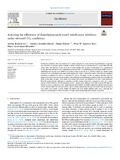Mostrar el registro sencillo del ítem
Assessing the efficiency of dimethylpyrazole-based nitrification inhibitors under elevated CO2 conditions
| dc.creator | Bozal-Leorri, Adrián | es_ES |
| dc.creator | González Murua, Carmen | es_ES |
| dc.creator | Marino Bilbao, Daniel | es_ES |
| dc.creator | Aparicio Tejo, Pedro María | es_ES |
| dc.creator | Corrochano Monsalve, Mario | es_ES |
| dc.date.accessioned | 2022-01-12T11:12:21Z | |
| dc.date.available | 2022-01-12T11:12:21Z | |
| dc.date.issued | 2021 | |
| dc.identifier.issn | 1872-6259 | |
| dc.identifier.uri | https://hdl.handle.net/2454/41716 | |
| dc.description.abstract | Nitrification inhibitors (NIs) are useful tools to reduce nitrogen (N) losses derived from fertilization in agriculture. However, it remains unclear whether a future climate scenario with elevated CO2 could affect NIs efficiency. Thus, the objective of this work was to study whether the increase of atmospheric CO2 concentration would affect the efficiency of two dimethylpyrazole-based NIs: 3,4-dimethylpyrazol phosphate (DMPP) and 3,4-dimethylpyrazol succinic acid (DMPSA) in a plant-soil microcosm. To do so, Hordeum vulgare var. Henley plants were grown in soil fertilized with ammonium sulphate (AS) with or without NIs under controlled environmental conditions at ambient CO2 (aCO(2)) or elevated CO2 (eCO(2); 700 ppm). In the soil, mineral nitrogen and N2O emission evolution were monitored together with nitrifying and denitrifying population that were quantified by qPCR. In the plant, biomass, total amino acid content and isotopic discrimination of N and C were measured. Both NIs showed greater efficiency to maintain soil NH4+ content under eCO(2) compared to aCO(2), as a consequence of 80% reduction of AOB abundance in eCO(2). Indeed, both inhibitors were able to lessen 53% the N2O emissions in eCO(2) compared to aCO(2). Regarding the plant, DMPP and DMPSA negatively affected plant biomass at aCO(2) but this effect was restored at eCO(2) due to a better ammonium tolerance associated with an increase in total amino acid content. Overall, DMPP and DMPSA NIs were highly efficient under eCO(2), reducing N2O emissions and keeping N in the soil stable for longer while maintaining plant biomass production. | en |
| dc.description.sponsorship | This project was funded by the Spanish Government (RTI2018-094623-B-C21 MCIU/AEI/FEDER, UE) and by the Basque Government (IT-932-16). Adrian Bozal-Leorri holds a grant from the Basque Government. Mario Corrochano-Monsalve holds a grant from the Ministry of Economy and Business of the Spanish Government (BES-2016-076725). | en |
| dc.format.extent | 10 p. | |
| dc.format.mimetype | application/pdf | en |
| dc.language.iso | eng | en |
| dc.publisher | Elsevier | |
| dc.relation.ispartof | Geoderma, 400, 2021 | |
| dc.rights | © 2021 The Authors. Creative Commons Attribution 4.0 International | en |
| dc.rights.uri | http://creativecommons.org/licenses/by/4.0/ | |
| dc.subject | Climate change | en |
| dc.subject | Nitrous oxide | en |
| dc.subject | N fertilization | en |
| dc.subject | Nitrification | en |
| dc.subject | Denitrification | en |
| dc.subject | Elevated CO2 | en |
| dc.title | Assessing the efficiency of dimethylpyrazole-based nitrification inhibitors under elevated CO2 conditions | en |
| dc.type | info:eu-repo/semantics/article | en |
| dc.type | Artículo / Artikulua | es |
| dc.contributor.department | Institute for Multidisciplinary Research in Applied Biology - IMAB | es_ES |
| dc.rights.accessRights | info:eu-repo/semantics/openAccess | en |
| dc.rights.accessRights | Acceso abierto / Sarbide irekia | es |
| dc.identifier.doi | 10.1016/j.geoderma.2021.115160 | |
| dc.relation.projectID | info:eu-repo/grantAgreement/AEI/Plan Estatal de Investigación Científica y Técnica y de Innovación 2017-2020/RTI2018-094623-B-C21/ES/ | en |
| dc.relation.publisherversion | http://doi.org/10.1016/j.geoderma.2021.115160 | |
| dc.type.version | info:eu-repo/semantics/publishedVersion | en |
| dc.type.version | Versión publicada / Argitaratu den bertsioa | es |



